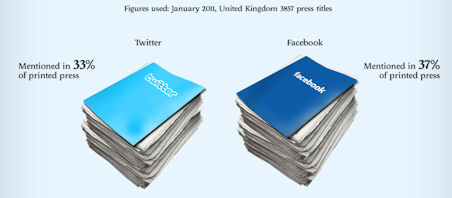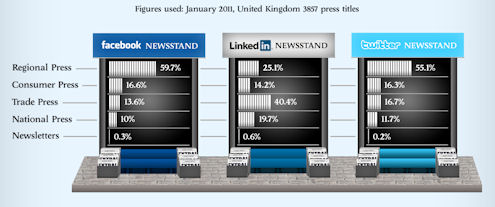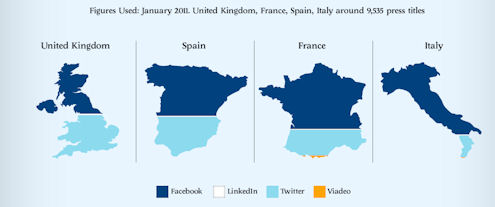The latest study from Pickanews shows that traditional media still dictate the news agenda, despite the power of social media. However, social media sites are often in the headlines, and we explore statistics showing how often print media talk about social network sites Twitter, Facebook and LinkedIn.
Print is dead, long live print! Manuel Zebeida, spokesman for media intelligence specialist Press Index and developer of search engine Pickanews, discusses the findings of a study that analyses how often the print media report stories about social media networks.
Prevalance of Social Media Mentions across Printed Media:

Research supplied by Pickanews
With the ubiquity of social networks and their transformative effects on our lives and the world at large, it’s tempting to see them as the predominant media. In the UK, around half of the population is on Facebook and social media accounts for 13 per cent of all website visits. As we watch, these networks are enabling global citizens to share critical information and challenge corrupt regimes. Surely the death of traditional media is nigh?
Distribution of Social Media Mentions Across Media Mentions Across Printed Press:

Research supplied by Pickanews
Well, no. Although the sharing of stories is increasingly happening across social networks, big media (print, broadcast and major websites) still dictates the news agenda. Recent academic research into trending topics on Twitter discovered that content generated by traditional news sources is far more likely to trend than anything else. In this way, newspapers and magazines retain much of the influence they held in the days before social media.
Social Media Mentions in Printed Press Across Countries:

Research supplied by Pickanews
But while established print media continue to set the agenda, social networks are becoming an important source of, and outlet for, news – and increasingly, the subject of stories themselves. This recent study reveals that, of the nearly 4,000 UK publications available to search for free, more than a third mentioned Twitter during January; the same is true for Facebook.
Looking at the contexts in which the press discusses Facebook and Twitter, national and regional newspapers provide the majority of mentions, reporting on the use of social networks to organise everything from the Egypt revolution to local pub crawls, on cultural concerns like cyber-bullying, and news about the sites themselves – such as the latest round of investment in Facebook.
There are subtle variations in the way the periodicals report on the different social networks. Facebook generates less coverage in the trade press than in consumer titles, which include calls to action encouraging readers to find the magazines, and the brands they feature, on Facebook. On Twitter, the reverse is true, as trade publications push readers to the microblogging site for concise, continual updates. The make up of print coverage of LinkedIn looks very different – the mentions it generates (far fewer than its rivals) are concentrated in trade titles, which is unsurprising considering its business focus. Without properties on LinkedIn to point readers towards, regional papers contributed a smaller proportion of coverage and, along with the national press, honed in on news about the network itself – including its rumoured plans to go public.
The Pickanews media search engine covers Spain, France and Italy, as well as the UK, and it is interesting to compare and contrast print coverage across all four regions. Given the greater saturation of LinkedIn in the UK than in southern European countries, the regional bias in its coverage makes complete sense. Likewise Twitter, mentions of which reflect the service’s penetration in each given country (expressed in this comScore report ). It is natural that France should dominate coverage of LinkedIn competitor Viadeo, as this is where the service originated. And, considering the pervasiveness of Facebook, it is no shock that this was the most discussed social media website in all the monitored countries, and that each country provided nearly as much coverage as the next.
No one can deny that social media is revolutionising the way in which people share news. But it is important to remember that, for the foreseeable future, mainstream media – such as newspapers and their online editions – will continue to set the news agenda. In order to build a complete picture of what people are talking about online, you must start at the source of the conversation – more often than not, print media.
Pickanews is a search engine from the Press Index Group that allows users to track coverage for current and prospective clients.
PR Masterclass: The Intersection of PR and GEO
Wednesday 25th February, both virtual and in person tickets are available.
PR MasterclassIf you enjoyed this article, sign up for free to our twice weekly editorial alert.
We have six email alerts in total - covering ESG, internal comms, PR jobs and events. Enter your email address below to find out more:





